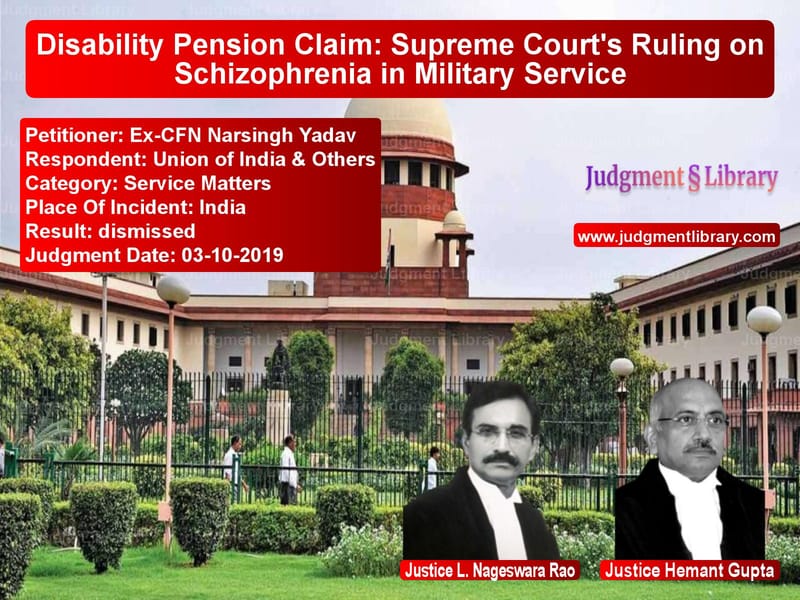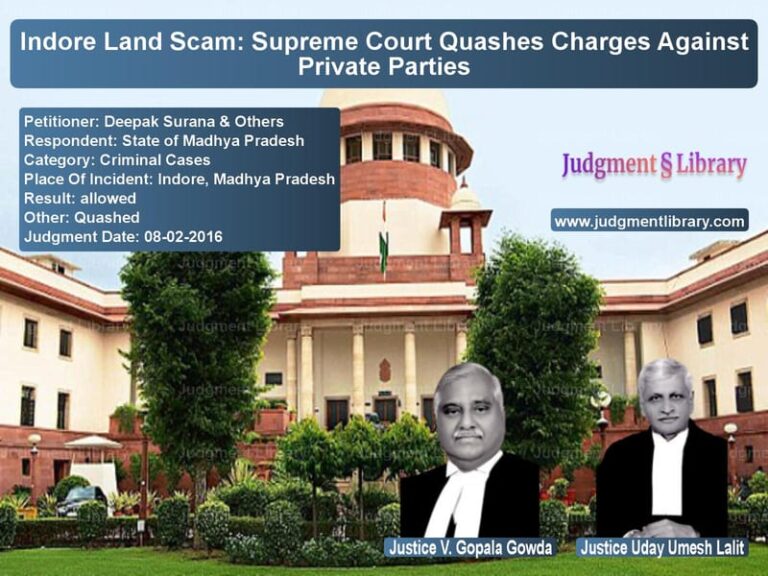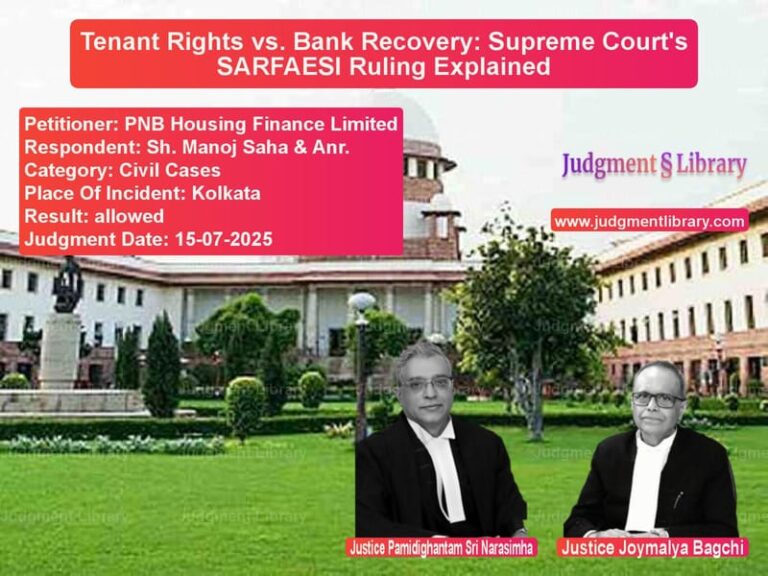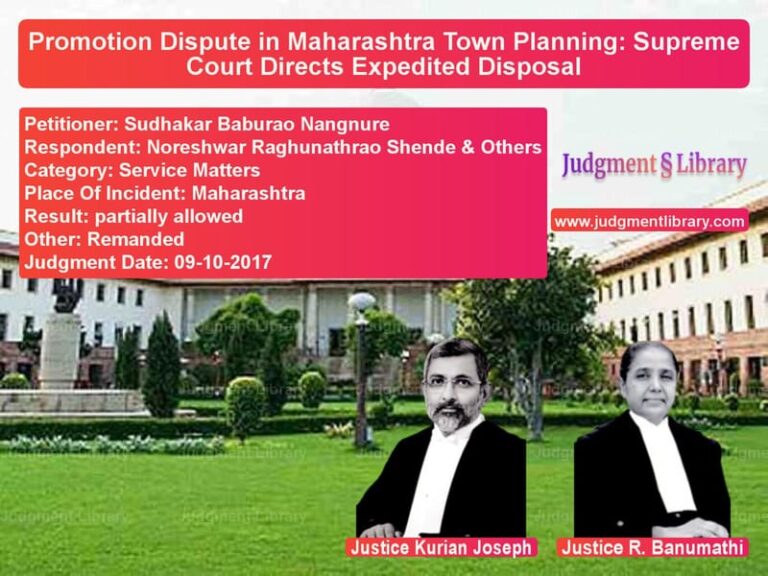Disability Pension Claim: Supreme Court’s Ruling on Schizophrenia in Military Service
The case of Ex-CFN Narsingh Yadav vs. Union of India & Others revolved around the denial of disability pension to a former soldier who was discharged from military service due to schizophrenia. The Supreme Court was tasked with determining whether his mental condition was attributable to or aggravated by military service.
Background of the Case
The appellant, Ex-CFN Narsingh Yadav, was enrolled in the Indian Army on December 2, 2003. He served as a Craftsman (CFN) in the Army but was later diagnosed with schizophrenia. The Invaliding Medical Board assessed his disability at 20% for five years but ruled that it was neither attributable to nor aggravated by military service. Consequently, he was discharged on May 8, 2007, and his claim for disability pension was rejected.
After his claim was denied at the departmental level, the appellant challenged the decision before the Armed Forces Tribunal (AFT), Lucknow. The tribunal upheld the rejection, leading to the present appeal before the Supreme Court.
Petitioner’s Arguments
The appellant, through his counsel, argued:
- No mental disorder was recorded at the time of his recruitment, implying that the condition must have developed during service.
- As per Entitlement Rules, 1982, if no pre-existing disease is noted at the time of entry, any subsequent ailment must be presumed to be attributable to service.
- The nature of military service, stress, and discipline could have triggered or aggravated his mental illness.
- He relied on previous Supreme Court rulings in Dharamvir Singh vs. Union of India (2013) and Union of India vs. Rajbir Singh (2015), which held that when no disability is recorded at the time of enrollment, it should be considered as service-related.
Respondents’ Arguments
The Union of India, representing the Army, countered with the following arguments:
- The appellant was posted at peace stations (Bhopal and Allahabad), where he was not exposed to severe stress or adverse conditions.
- His schizophrenia was a relapsing mental disorder, which may have existed before his enrollment.
- The Medical Board clearly stated that the disease was neither attributable to nor aggravated by military service.
- Not all disabilities that appear during service are service-related, as some diseases remain latent until triggered by personal factors.
Supreme Court’s Observations
The Supreme Court carefully examined the case and made the following key observations:
“Mental disorders such as schizophrenia may not manifest at the time of enrollment but can develop later due to genetic or personal factors unrelated to military service.”
Further, the Court noted:
- Schizophrenia is listed as a disorder that may remain undetectable at the time of recruitment and is not necessarily aggravated by service conditions.
- Entitlement to disability pension cannot be granted solely based on the absence of pre-existing medical records.
- The appellant was stationed in normal peace postings, and no evidence suggested that military conditions contributed to his illness.
- The decision of the Medical Board must be respected unless there is strong medical evidence proving otherwise.
Final Verdict
The Supreme Court ruled in favor of the respondents and dismissed the appeal, stating:
- The Medical Board’s decision was valid and properly reasoned.
- There was no link between the appellant’s service and his mental disorder.
- Disability pension cannot be granted unless service conditions directly contribute to or aggravate the disease.
- The claim was rejected as per existing rules and legal precedents.
Legal and Policy Implications
The ruling has major implications for military disability pensions:
- Schizophrenia and similar mental disorders may not qualify for pension benefits unless directly linked to military service.
- Medical Board decisions are given primacy, and courts will not interfere without compelling medical evidence.
- Peace postings do not automatically qualify a soldier for disability benefits unless the service environment contributes to the illness.
Conclusion
The Supreme Court’s ruling reinforces the importance of clear medical evidence when claiming disability pensions. While previous cases have favored veterans in similar situations, this judgment sets a precedent that mental illnesses must be directly attributable to service conditions to qualify for benefits. This decision balances the interests of ex-servicemen while ensuring that only genuine cases receive disability pensions.
Petitioner Name: Ex-CFN Narsingh Yadav.Respondent Name: Union of India & Others.Judgment By: Justice L. Nageswara Rao, Justice Hemant Gupta.Place Of Incident: India.Judgment Date: 03-10-2019.
Don’t miss out on the full details! Download the complete judgment in PDF format below and gain valuable insights instantly!
Download Judgment: Ex-CFN Narsingh Yada vs Union of India & Oth Supreme Court of India Judgment Dated 03-10-2019.pdf
Direct Downlaod Judgment: Direct downlaod this Judgment
See all petitions in Pension and Gratuity
See all petitions in Public Sector Employees
See all petitions in Disciplinary Proceedings
See all petitions in Judgment by L. Nageswara Rao
See all petitions in Judgment by Hemant Gupta
See all petitions in dismissed
See all petitions in supreme court of India judgments October 2019
See all petitions in 2019 judgments
See all posts in Service Matters Category
See all allowed petitions in Service Matters Category
See all Dismissed petitions in Service Matters Category
See all partially allowed petitions in Service Matters Category







